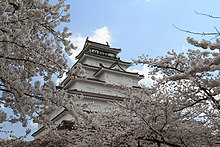| Aizu Domain 会津藩 Aizu-han | |||||||||
|---|---|---|---|---|---|---|---|---|---|
| Domain of Japan | |||||||||
| 1601–1869 | |||||||||
 Reconstructed Tsuruga Castle in Aizuwakamatsu | |||||||||
Mon of the Aizu-Matsudaira
| |||||||||
| Capital | Tsuruga Castle | ||||||||
| Government | |||||||||
| Daimyō | |||||||||
• 1601–1612 | Gamō Hideyuki (first) | ||||||||
• 1858–1868 | Matsudaira Nobunori (last) | ||||||||
| Historical era | Edo period | ||||||||
• Established | 1601 | ||||||||
| 1869 | |||||||||
| Contained within | |||||||||
| • Province | Mutsu | ||||||||
| |||||||||
| Today part of | Fukushima Prefecture | ||||||||
Aizu Domain (会津藩, Aizu-han) was a domain of the Tokugawa Shogunate of Japan during the Edo period from 1601 to 1871.[1]
The Aizu Domain was based at Tsuruga Castle in Mutsu Province, the core of the modern city of Aizuwakamatsu, located in the Tōhoku region of the island of Honshu. The Aizu Domain was ruled for most of its existence by the shinpan daimyō of the Aizu-Matsudaira clan, a local cadet branch of the ruling Tokugawa clan, but was briefly ruled by the tozama daimyō of the Gamō and Katō clans. The Aizu Domain was assessed under the Kokudaka system with a peak value of 919,000 koku, but this was reduced to 230,000 koku. The Aizu Domain was dissolved in the abolition of the han system in 1871 by the Meiji government and its territory was absorbed into Fukushima Prefecture, covering much of the traditional region of Aizu.
- ^ Ravina, Mark. (1998). Land and Lordship in Early Modern Japan, p. 222.

